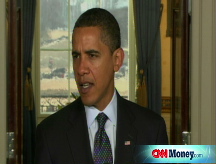Angry shareholders demand change
With Corporate America on the ropes, shareholder activists are hoping for big victories this proxy season, particularly on measures tied to executive pay.
 |
| Shareholders are expected to voice their anger at the ballot box this proxy season. |
NEW YORK (CNNMoney.com) -- At long last, angry shareholders may finally have their day.
In the coming weeks, investors will find themselves steeped in the annual ritual known as proxy season, a time where corporations give stockholders a rundown on their operations and discuss other issues near and dear to investors' hearts.
This year, shareholders, particularly those at major banks and other financial institutions, have a litany of grievances related to the current economic crisis: inadequate risk management practices, insufficient oversight by board members and oversized pay packages doled out to some bankers.
And that's to say nothing of the value of their stock holdings, which are just a fraction of what they were a year ago.
"Investors are angry about the losses they have suffered," said Amy Borrus, deputy director at the Council of Institutional Investors, a non-profit association of public, union and corporate pension funds. "But there is a sense of increased opportunity. Suddenly, a lot of what shareholders want seems to be coming their way."
One concession that investors are aggressively angling for is for Corporate America to make big changes as to how they determine executive pay.
Shareholder activists have pitched dozens of measures so far this year aimed at giving investors a vote, or a so-called "say on pay", when determining compensation packages for senior management.
From embattled institutions like Citigroup (C, Fortune 500) and automaker General Motors (GM, Fortune 500) to consumer products giant Colgate-Palmolive (CL, Fortune 500), investors have ratcheted up the pressure in the hopes of more closely aligning executive pay packages to a firm's overall performance.
Such measures have failed to garner broader support in recent years due largely to a lack of consensus on the issue among large institutional shareholders, such as public pensions and mutual funds.
But that may be changing as shareholder activists win over other hard-hit investors. In addition, now that the government owns stakes in many large banks, the interests of shareholder activists are now closely tied with that of taxpayers and lawmakers.
Outrage over unchecked spending by financial firms that took in billions of dollars in government aid not only prompted the Obama administration to institute executive salary caps for companies seeking additional assistance, but also a last-minute addition to the recent stimulus package that would rein in bonuses for top earners at firms that received money previously.
That could prompt many companies to put a "say on pay" measure up for a vote at their annual shareholder meeting this year. Some corporate governance experts even anticipate it could become law before long.
In the meantime, some investor groups are hoping to harness that hostility. The AFL-CIO and the Firefighters' Pension System of the City of Kansas City, Missouri, for example, are just two organizations that have taken aim at other alleged compensation abuses this proxy season, including the practice of "golden coffins" where exorbitant payments are made to executives' estates, after their death.
Measures aimed at pushing companies to take a "greener", or more environmentally friendly approach, are also expected to remain in the mix this proxy season, as well as proposals that would require companies to disclose their political contributions.
Still, much of the focus will be on rooting out the problems that may have helped contribute to the current economic woes, said Richard Ferlauto, the director of corporate governance and pension investment at the American Federation of State, County and Municipal Employees, or AFSCME.
Ferlauto, whose organization has been heavily involved in trying to curb runaway executive pay, is among those pushing for greater oversight at the board level, particularly among financial services firms.
Two ways that could be done is by forcing companies to elect an independent chairman and also requiring that directors win a majority vote from shareholders before they are elected.
"There will be a laser-light focus on how to fix executive compensation," said Ferlauto. "But a broader and recurring theme is how do you make boards more accountable to shareholders so this disaster doesn't happen again?" ![]()


